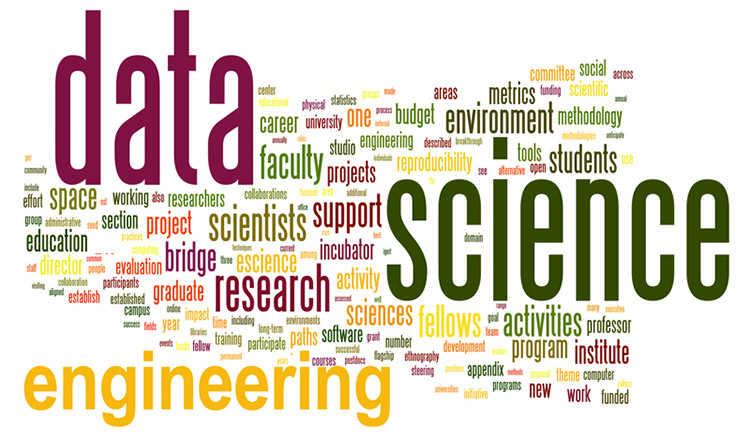
UC San Diego to Launch New Master’s Program in Data Science and Engineering
Computer Science and Engineering, SDSC Program to Start in Fall 2014
Published Date
By:
- Jan Zverina
Share This:
Article Content

The University of California, San Diego has announced a new master’s degree program in Data Science and Engineering, intended for working professionals with a broad educational background and/or training in computer science, engineering, or mathematics.
The Data Science and Engineering master’s degree program is taught by world-renowned professors and researchers from the Department of Computer Science and Engineering (CSE) in the UC San Diego Jacobs School of Engineering, in collaboration with the university’s San Diego Supercomputer Center (SDSC). The two-year, part-time program is completed in person on the UC San Diego campus and leads to a Master of Advanced Study (MAS) degree.
“The data scientist is a new kind of professional, one who combines the skills of a software programmer, database manager, statistician, and communicator capable of creating mathematics-based models of data, identifying trends and deviations, and presenting them in compelling, visual ways,” said Rajesh Gupta, professor and chair in the Department of Computer Science and Engineering. “The very nature and process of scientific research is changing in the era of ‘big data’, and this innovative master’s program is our response to the growing demand for data scientists able to meet this new challenge.”
UC San Diego has begun accepting applications for the inaugural MAS program in Data Science and Engineering, to begin this fall. (To apply for the Fall 2014 term, visit the admissions page and complete the online application form.)
“The Data Science and Engineering program will be particularly valuable to enrolled students and their current and future employers,” said Albert P. Pisano, Dean of the Jacobs School of Engineering. “The program is rooted in computational engineering and incorporates the analytical sophistication of computer science and engineering design. By collaborating with the San Diego Supercomputer Center, our students will learn best practices from one of the leading academic institutions in big data.”
One of a Kind Nationwide
Data science refers to large, diverse, complex, longitudinal, and distributed data sets generated from instruments, sensors, Internet transactions, email, video, click streams, and other digital sources available today and into the foreseeable future. While several institutions have in recent years established master’s programs in analytics, only a small percentage are part time, and fewer still are based on the West Coast. Moreover, most of these programs are geared toward students of business and statistics.
“This program is unique,” said Computer Science Professor Yoav Freund. “Rather than traditional full-time students who can only take coursework during the day, Data Science and Engineering courses will be scheduled when working professionals are typically available. Also, unlike more purely academic approaches to computer science education, our curriculum builds on fundamentals but extends into a new realm of study that has direct application for working professionals.”
Freund is one of the Data Science and Engineering program’s founding faculty, along with computer science professors Yannis Papakonstantinou, Sanjoy Dasgupta and Alin Deutsch, as well as four SDSC research scientists: Chaitanya Baru, Natasha Balac, Amit Chourasia, and Amarnath Gupta.
A unique strength of the Data Science and Engineering program is its emphasis on databases. Another distinctive feature is its collaboration with SDSC. Students will engage with the center’s technical staff and participate in a capstone project that utilizes SDSC’s unique resources and expertise.
“Each day the world is becoming not only more digitized, but how we share data covering all aspects of life is easier and more immediate than ever before,” said SDSC Director Michael Norman, “Managed well, this data can be used to unlock new sources of economic value and provide fresh insights into scientific discovery.”
The concept for the Data Science and Engineering program emerged from discussions with local industry representatives of UC San Diego’s Departmental Advisory Councils and the Jacobs School’s Corporate Affiliates Program (CAP). According to CAP Director Anne O’Donnell, UC San Diego faculty members were eager to hear from a diverse group of companies with varying data-science needs for storage, retrieval and analytics.
Ultimately, 14 companies provided letters of support: Cubic Transportation Systems, Encore Capital, ID Analytics, Informatica, Intuit, Intel, Kaiser Permanente, Leidos/SAIC, Mitchell International, Opera Solutions, Provide Commerce, Qualcomm, Sempra Energy/SDG&E, and Teradata.
Designed for Working Professionals
The master’s program is designed for working professionals and has been built on the infrastructure of three highly successful Master of Advanced Study programs at the Jacobs School of Engineering: Wireless Embedded Systems, Medical Device Engineering, and Architecture-Based Enterprise Systems Engineering. In 2014, 65 engineering professionals will earn MAS degrees at the Jacobs School while working full time.
Prospective students should have backgrounds in engineering, physical sciences, social sciences and business, but also in mathematics (linear algebra, calculus, probability and statistics), programming and algorithmic thinking, problem solving, and knowledge of programming languages. Students also are expected to have a working knowledge of cloud infrastructure and some experience with analytic methods and tools. Additional requirements and other program details can be found at http://maseng.ucsd.edu/dse/.
The Data Science and Engineering program is structured to let students complete the MAS degree in two years. The curriculum consists of seven required courses (three foundational courses and four core courses), two electives chosen from six course options, and a two-quarter capstone project course, for a total of 38 units.
Admissions officials estimate initial enrollment of approximately 25 students per year. The day-long course sessions will be held on alternating weekends, on a Friday/Saturday schedule, with instructional materials also available online to make participation as convenient as possible.
Share This:
You May Also Like
Stay in the Know
Keep up with all the latest from UC San Diego. Subscribe to the newsletter today.


